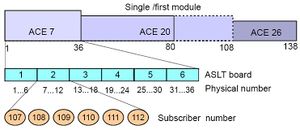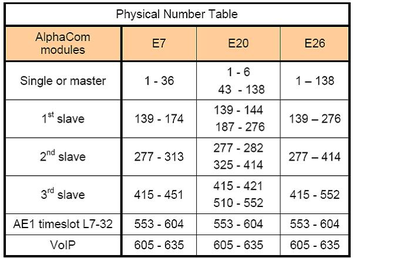Physical number
From Zenitel Wiki

Each subscriber point in an AlphaCom exchange has a physical number. The physical numbers are in the range from 1 to 552. The number is determined by the board position and the type of module (master/slave). The physical number is linked to a Directory number in software. The directory number series 101 to 499 and 5000 to 5152 are default directory numbers for all AlphaCom exchanges. The directory number can be changed by using the AlphaPro programming tool.
A physical number is often refered to as a subscriber port.

AlphaCom E7
In the AlphaCom E7 (and the AlphaCom M) the physical numbers are in the range 1 - 36. Corresponding default directory numbers are 101 - 136. However, physical number 5 and 6 are by default set for audio program input. Physical number 5 and 6 can be changed to station use if required.
AlphaCom E20
The physical numbers are in the range 1 - 6, and 43 - 138. Since the card positions 2 - 7 are not used in AlphaCom E20 (and 80+), the physical numbers 7 to 42 and the corresponding default directory numbers 107 - 142 are missing.
AlphaCom E26
In the AlphaCom E26 (and AlphaCom 138) the physical numbers are in the range 1 - 138. Corresponding default directory numbers are 101 - 238.
IP Stations
IP stations must be assigned to a physical number in the range of 1 to 552. This number can be any number below 552, but must not overlap star wired station physical numbers.
It is recommended to start the numbering of IP stations from 552 and downwards to avoid occupied number problems if the exchange is extended with more star wired stations later on. However, in single module AlphaCom E7 the IP Station can start on physical number 37, and in AlphaCom E20 the IP stations can use the free physical numbers in the range 7 - 42.
AE1 timeslots
The physical numbers 553 to 604 are reserved for timeslots 7 to 32 when AE1 boards are used.
VoIP channels
The physical numbers 605 to 634 are logical numbers inside the AlphaCom E, reserved for VoIP channels used by AlphaNet, MultiModule and SIP.
